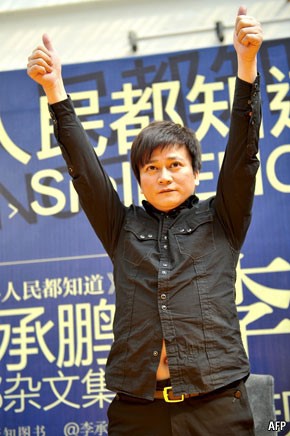

 字體:小 中 大
字體:小 中 大 |
|
|
|
| 2019/10/27 20:33:55瀏覽103|回應0|推薦0 | |
這篇正值國際媒體關心中共是否會作政治上,或是對民眾、市場管理的變革。同時期,以由下往上來看,最著名者就是李承鵬,倡議言論自由和思想開放,以自己的話討論人民民主思想和自由主義的憧景。於是他在書中常提倡社會改革的想法。但是當局仍不希望政策是民眾的自發性提議討論,當時的李承鵬履次在其部落格呼喊其言行常被糾正。
Political activismLocal heroA popular writer and blogger tests the limits of free speechFeb 2nd 2013 | CHENGDU |From the print edition
I’m Li Chengpeng—everybody knows me
WHILE China’s first Nobel peace prize laureate, Liu Xiaobo, still languishes in prison, and the artist and provocateur-in-chief, Ai Weiwei, still appeals more to a foreign audience, a new group of local activists are tweaking the tail of the Communist Party. Perhaps chief among them is a former sports writer, Li Chengpeng. Mr Li has recently stirred up a storm with a new book entitled “Everybody in the World Knows”, a collection of sharp essays on his country’s social ills. During a book tour in January he was mobbed by his fans, physically attacked by his enemies and, eventually, silenced by the Chinese authorities.
Thousands of supporters turned out to meet the author in Chengdu, Beijing and Shenzhen. On January 12th, just before his book-signing in Chengdu, Mr Li announced to his 6.7m followers on Sina Weibo, China’s home-grown version of Twitter: “I am not allowed to speak, not allowed to give opening remarks, I am not even allowed to wish you a happy new year.” Instead he wore a black mask over his mouth and the words “I love you all” written on his shirt. The crowd roared its approval, and snapped up copies of his book by the armload.
In this section · Own goal · Local hero His reception in Beijing went less smoothly. One self-proclaimed Maoist hurled a kitchen knife at him and another punched him in the face. Some Maoists regard him as a traitor for his criticism of the Communist Party. After further cries of treason at the book-signing in Shenzhen, the police have chosen to rein in Mr Li. He texted a reporter to explain that he was being taken away for “a chat”. An appearance in Guangzhou was suddenly cancelled.
Mr Li is no stranger to threats and government pressure. Working as a sports writer from the early 1990s, he focused on corruption in sport, culminating in a book in 2010 called “Chinese Football: The Inside Story”. It detailed match-fixing and bribery across the country and brought down the wrath of angry trainers, “patriotic readers” and government censors.
Soon after the Sichuan earthquake in 2008, which killed more than 80,000 people, Mr Li moved from sports reporting to writing essays on politics and society. He went on to publish a novel in 2011, entitled “Li Kele Protests Demolitions”, which became an immediate hit. His descriptions, in fiction and non-fiction, of ordinary people uniting to fight venal, faceless forces propelled him into the arms of a more organised new audience: China’s advocates for social reform.
Later that year Mr Li said that he would be running for public office in Chengdu as an independent. Although his election campaign was never allowed to get under way (candidates for office are carefully screened by the Communist Party), he gained new credibility. Here, it seemed, was a rare man who would back up his words with actions.
At the book launch in Chengdu an elderly man named Liu Shahe sat behind Mr Li. Mr Liu is one of the signatories of Charter 08, the document demanding a list of political reforms that Liu Xiaobo, the Nobel laureate, was jailed for drafting. Mr Li tweeted Mr Liu’s message to him—“you, man of words, just keep writing”—and said the encouragement from the older man had reduced him to tears.
Since then Mr Li has turned down the volume a notch. In a blogpost he urged his fans to pay attention to “bigger issues” like corruption, food safety and pollution and not focus so much on him and his book. But in an age short of heroes, the Chinese public still loves to hear someone who dares to speak truth to power.
Local hero Feb 5th 2013, 12:11
There is just a calm quiet voice of the Economist who recently goes very exhausted to these activities in Analects and this column. As a defender of Beijing’s Communist Party, I take this chance to share something about free speech.
In retrospect of Hu Jing-tao’s tenure, social unrest and the inequality becomes severe failing to parallel the development of macroeconomics as a result of Hu’s lossening up the control of bureaucracy. Thus, some order or policy is hard to keep the same meaning from top to the first line, lack of self-discpline. Besides the packet of complex mechanism, the corruption in the dark is a critical argument.
I am a weibo-user as well. Sometimes, I surf this kind of speaking or so-called public awareness through browser. The same characteristic is the grape of pictures, some blazing shout with grouch, uh nh hh, and a handsome pose. But the vast majority of activists stay local or limited owing to the issue-inclined speaking or the unfair treatment of judiciary.
Because Xi Jin-ping and Li Ke-qiang owned the experience of local provincial work, in addition to Wang Yang’s opening mind of social network, I give some advice of free speech or censorship for my convenience. In Taiwan, in the past decades, I have supported Chen Shui-bian and Kaohsiung Incident’s figures, who once built up the miracle of Asian democracy in the Third Wave of democratization. But it’s okay for me to chase the political right in Beijing, borrowing from the idea of French outstanding premier Armand de Richelieu, especially when the chocolate Ma Ying-jeou and the evil Lee Tung-huee called “all new Taiwanese” still mix the confused together. In comparison with Taiwan’s relative low in economics number and unstable situation, China’s solid fifth-generation ruling is the only way to have my ability and learning from these elder in Democratic Progressive Party put into practice in reality.
Undeniably, since Wen Jia-bao’s saying of revision for reasonable system parallel to the advanced in CNN interview two years ago, Beijing is questioned or shows the signal of the willingness. This time at the turning point of power’s takeover, it is so silent between two sides either for or against officials. Last month, Guangdong’s some journalists uttered the demand of free speech but there is few consequence.
On Jan. 24, a positive idea is figured out in public when Li Jing-tian, Senior Vice President of the Central Party School of the Communist Party of China, made a speech at the World Economic Forum in Davos. The following is that days Bloomberg report.
…… “The social media is actually strengthening supervision of the Chinese officials” and “this is a very good thing,” he said today during a panel discussion at the World Economic Forum in Davos. “To guarantee the freedom of the media, of the press, this is the common goal of the administrations of all the countries in the world, and this is an issue remaining to be solved.”
Asked if he thinks the Chinese leadership will allow media to report more freely in China, Li said: “We need to minimize our mistakes, we need to be supervised by different parties, including the supervision from the society, from the people” and “the media.”
(By contrast) Harvard professor Kenneth Rogoff, who sat on the same panel, said it is essential for China to relinquish controls on the Internet to foster academic research. …… Well, Li said social media are helping his country move toward a greater degree of press freedom. Yesterday, Baidu’s chairman Li Yan-hong (Robin Li), China’s third-richest man, was named to CPPCC after Jia Qing-lin. It’s a good news for me while seeing one of Polituburo’s member Liu Yun-shan’s oppressing social network on Internet. It cheers me especially now when I intensively reprimand Beijing and Taipei’s TV media with bomber due to their “helper” of economic downturn and the good play of “big gay show” on TV.
I agree the attitude toward the deregulated means of social harmony. Let me ponder a miserable one of censorship, involving Cheng Nan-rong who immolated himself to protest against severe censorship of the press in front of Taipei’s ruling head office.
Of course, there is no thought of this screen anymore and there is a need to promote the public interest in case of reproach to policy-practicing. In the short time, it seems to hardly see any Falun Gong or Bo’s laugh, let alone any last laugh, because there is no organization and just a vendor in China and Chinese blog. I remind these bloggers of wider vision when it comes to the words which they see as the leading or the shrine concerned. Moreover, the common in ordinary people is needed to know, like “Wish you well” from Tibetan monk Singa Rinpoche:
http://www.youtube.com/watch?feature=player_detailpage&v=qIkRm-bjgj4
Yeah, and if anyone gives response to me, maybe I go to see the funny one after another except for Wang Dang’s Internet college in San Francicso.
Recommended 8 Report Permalink
2月14日時,在部落格Analect有一篇提出毛澤東的毛病的文章
Inviting criticismSnakes and flowersFeb 14th 2013, 8:59 by T.P. | BEIJING
Once bitten, twice shy?
NOT for the first time, a Chinese leader has made a public appeal for frank and open criticism. The party “should be able to put up with sharp criticism, correct mistakes if it has committed them and avoid them if it has not," Xi Jinping said February 6th. Non-party members, he added, should “have the courage to tell the truth, speak words jarring on the ear, and truthfully reflect public aspirations.”
That the public response was so prompt comes as no surprise to those who are familiar with China’s vibrant and outspoken community of online commentators. Nor is it surprising that so many responses were cynical, considering the similarity to another appeal that was made more than 50 years ago.
In 1956 Mao Zedong launched his “Hundred Flowers” campaign, in which he urged intellectuals to air critical views. National policies would be improved, he promised, by “letting a hundred flowers bloom and a hundred schools of thought contend.”
The responses were slow at first but later came flooding in—in the form of letters, posters, and published articles—and by the middle of 1957 Mao had heard enough. Many who had dared to speak up found themselves targeted as “rightists”, and subjected to harsh persecution. Some were purged from the party and government; some ended up in labour camps.
Historians remain divided as to whether Mao had meant from the outset for the campaign to be laid as a trap, or whether he changed tack after being surprised by the criticism. He did boast later that he had “enticed the snakes out of their caves”. That infamous remark makes the timing of Mr Xi’s new appeal rather unfortunate. He was speaking at a reception to ring in the Chinese calendar’s year of the snake.
Like Mao before him, who said criticism should be frank but “healthy,” Mr Xi made clear that critics must uphold the basic tenets of “socialism with Chinese characteristics”. Unlike Mao, Mr Xi must grapple with millions of citizens who have quick and easy access to social-media outlets. Some have openly questioned whether he is in fact hunting for snakes. Others have challenged him to end the censorship of books, news media and internet commentary, and to stop harassing political activists.
But not all of the new-media commentary has been so unkind to Mr Xi. Soon after he ascended to the top job, he became the subject of “The Fan Club of Learning from Xi” on Sina Weibo, a microblogging platform in the model of Twitter. It tends to feature humanising and candid (but not always flattering) photos—of a sort that would be hard for ordinary citizens to obtain. Many of its readers wonder whether it was a clever official attempt to polish the new leader’s image, rather than the grass-roots enterprise it purports to be.
On February 11th a university drop-out and migrant worker named Zhang Hongming came forward to tell the Associated Press, “It’s just me. It’s completely an individual act.” So far, he added, none of the relevant authorities had spoken with him. That, of course, could change. The year of the snake has only just begun. (Picture credit: AFP)
|
|
| ( 心情隨筆|心情日記 ) |












